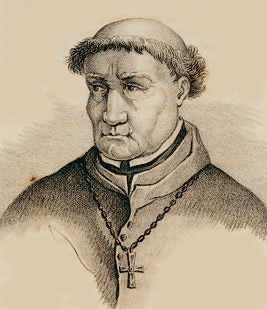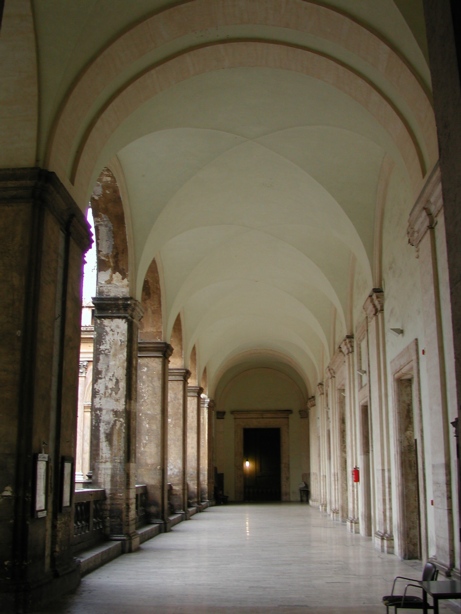|
Innocent XII
Pope Innocent XII ( la, Innocentius XII; it, Innocenzo XII; 13 March 1615 – 27 September 1700), born Antonio Pignatelli, was head of the Catholic Church and ruler of the Papal States from 12 July 1691 to his death in September 1700. He took a hard stance against nepotism in the Church, continuing the policies of Pope Innocent XI, who started the battle against nepotism but which did not gain traction under Pope Alexander VIII. To that end, he issued a papal bull strictly forbidding it. The pope also used this bull to ensure that no revenue or land could be bestowed on relatives. Biography Early life Antonio Pignatelli was born on 13 March 1615 in SpinazzolaOtt, Michael. "Pope Innocent XII." The Catholic Encyclopedia Vol. 8. New York: Robert Appleton Company, 1910. 4 February 2019 (now in ... [...More Info...] [...Related Items...] OR: [Wikipedia] [Google] [Baidu] |
List Of Popes
This chronological list of popes corresponds to that given in the ''Annuario Pontificio'' under the heading "I Sommi Pontefici Romani" (The Roman Supreme Pontiffs), excluding those that are explicitly indicated as antipopes. Published every year by the Roman Curia, the ''Annuario Pontificio'' no longer #Numbering of popes, identifies popes by regnal number, stating that it is impossible to decide which pope represented the legitimate succession at various times. The 2001 edition of the ''Annuario Pontificio'' introduced "almost 200 corrections to its existing biographies of the popes, from St Peter to John Paul II". The corrections concerned dates, especially in the first two centuries, birthplaces and the family name of one pope. The term ''Pope (word), pope'' ( la, text=papa, translation=father) is used in several churches to denote their high spiritual leaders (for example Coptic pope). This title in English usage usually refers to the head of the Catholic Church. The Cathol ... [...More Info...] [...Related Items...] OR: [Wikipedia] [Google] [Baidu] |
Nepotism
Nepotism is an advantage, privilege, or position that is granted to relatives and friends in an occupation or field. These fields may include but are not limited to, business, politics, academia, entertainment, sports, fitness, religion, and other activities. The term originated with the assignment of nephews to important positions by Catholic popes and bishops. Nepotism has been criticized since the ancient times by several philosophers, including Aristotle, Valluvar, and Confucius, condemning it as both evil and unwise. Origins The term comes from Italian word ''nepotismo'',"Nepotism." Dictionary.com. Retrieved 20 June 2013. which is based on Latin root ''nepos'' meaning nephew. Since the an ... [...More Info...] [...Related Items...] OR: [Wikipedia] [Google] [Baidu] |
Inquisitor
An inquisitor was an official (usually with judicial or investigative functions) in an inquisition – an organization or program intended to eliminate heresy and other things contrary to the doctrine or teachings of the Catholic faith. Literally, an inquisitor is one who "searches out" or "inquires" (Latin ''inquirere'' < ''quaerere'', 'to seek'). Inquisitors sought out the social networks that people used to spread heresy. There were accounts where the Inquisition could not tell who was a heretic or devout, and they were killed anyway. One of these accounts was Arnaud Amalric at the storming of Béziers. The abbot was recorded as saying “Kill them. For God knows who are his.” This brought up concern about the role the Inquisition was playing and whether or not it was a truly righteous cause. The rol ... [...More Info...] [...Related Items...] OR: [Wikipedia] [Google] [Baidu] |
Malta
Malta ( , , ), officially the Republic of Malta ( mt, Repubblika ta' Malta ), is an island country in the Mediterranean Sea. It consists of an archipelago, between Italy and Libya, and is often considered a part of Southern Europe. It lies south of Sicily (Italy), east of Tunisia, and north of Libya. The official languages are Maltese and English, and 66% of the current Maltese population is at least conversational in the Italian language. Malta has been inhabited since approximately 5900 BC. Its location in the centre of the Mediterranean has historically given it great strategic importance as a naval base, with a succession of powers having contested and ruled the islands, including the Phoenicians and Carthaginians, Romans, Greeks, Arabs, Normans, Aragonese, Knights of St. John, French, and British, amongst others. With a population of about 516,000 over an area of , Malta is the world's tenth-smallest country in area and fourth most densely populated sovereign cou ... [...More Info...] [...Related Items...] OR: [Wikipedia] [Google] [Baidu] |
Apostolic Signatura
The Supreme Tribunal of the Apostolic Signatura () is the highest judicial authority in the Catholic Church (apart from the pope himself, who as supreme ecclesiastical judge is the final point of appeal for any ecclesiastical judgment). In addition, it oversees the administration of justice in the church.Apostolic constitution ''Pastor Bonus'', 121-125 (translation revised by the Secretariat of State (Holy See)). Since 8 November 2014, the prefect of the Supreme Tribunal of the Apostolic Signatura has been Cardinal |
Pope Urban VIII
Pope Urban VIII ( la, Urbanus VIII; it, Urbano VIII; baptised 5 April 1568 – 29 July 1644), born Maffeo Vincenzo Barberini, was head of the Catholic Church and ruler of the Papal States from 6 August 1623 to his death in July 1644. As pope, he expanded the papal territory by force of arms and advantageous politicking, and was also a prominent patron of the arts and a reformer of Church missions. However, the massive debts incurred during his pontificate greatly weakened his successors, who were unable to maintain the papacy's longstanding political and military influence in Europe. He was also an opponent of Copernicanism and involved in the Galileo affair. He is the last pope to date to take the pontifical name "Urban". Biography Early life He was born Maffeo Vincenzo Barberini in April 1568 to Antonio Barberini, a Florentine nobleman, and Camilla Barbadoro. He was born at Barberino Val d'Elsa in "Tafania" house. His father died when he was only three years old and hi ... [...More Info...] [...Related Items...] OR: [Wikipedia] [Google] [Baidu] |
Court (royal)
A royal court, often called simply a court when the royal context is clear, is an extended royal household in a monarchy, including all those who regularly attend on a monarch, or another central figure. Hence, the word "court" may also be applied to the coterie of a senior member of the nobility. Royal courts may have their seat in a designated place, several specific places, or be a mobile, itinerant court. In the largest courts, the royal households, many thousands of individuals comprised the court. These courtiers included the monarch or noble's camarilla and retinue, household, nobility, clergy, those with court appointments, bodyguards, and may also include emissaries from other kingdoms or visitors to the court. Prince étranger, Foreign princes and foreign nobility in exile may also seek refuge at a court. Near East, Near Eastern and Far East, Far Eastern courts often included the harem and Concubinage, concubines as well as eunuchs who fulfilled a variety of functions. ... [...More Info...] [...Related Items...] OR: [Wikipedia] [Google] [Baidu] |
Canon Law
Canon law (from grc, κανών, , a 'straight measuring rod, ruler') is a set of ordinances and regulations made by ecclesiastical authority (church leadership) for the government of a Christian organization or church and its members. It is the internal ecclesiastical law, or operational policy, governing the Catholic Church (both the Latin Church and the Eastern Catholic Churches), the Eastern Orthodox and Oriental Orthodox churches, and the individual national churches within the Anglican Communion. The way that such church law is legislated, interpreted and at times adjudicated varies widely among these four bodies of churches. In all three traditions, a canon was originally a rule adopted by a church council; these canons formed the foundation of canon law. Etymology Greek / grc, κανών, Arabic / , Hebrew / , 'straight'; a rule, code, standard, or measure; the root meaning in all these languages is 'reed'; see also the Romance-language ancestors of the Engli ... [...More Info...] [...Related Items...] OR: [Wikipedia] [Google] [Baidu] |
Doctorate
A doctorate (from Latin ''docere'', "to teach"), doctor's degree (from Latin ''doctor'', "teacher"), or doctoral degree is an academic degree awarded by universities and some other educational institutions, derived from the ancient formalism ''licentia docendi'' ("licence to teach"). In most countries, a research degree qualifies the holder to teach at university level in the degree's field or work in a specific profession. There are a number of doctoral degrees; the most common is the Doctor of Philosophy (PhD), awarded in many different fields, ranging from the humanities to scientific disciplines. In the United States and some other countries, there are also some types of technical or professional degrees that include "doctor" in their name and are classified as a doctorate in some of those countries. Professional doctorates historically came about to meet the needs of practitioners in a variety of disciplines. Many universities also award honorary doctorates to individuals d ... [...More Info...] [...Related Items...] OR: [Wikipedia] [Google] [Baidu] |
Collegio Romano
The Roman College ( la, Collegium Romanum, it, Collegio Romano) was a school established by St. Ignatius of Loyola in 1551, just 11 years after he founded the Society of Jesus (Jesuits). It quickly grew to include classes from elementary school through university level and moved to several successive locations to accommodate its burgeoning student population. With the patronage of Pope Gregory XIII, the final seat of the Roman College was built in 1584 near the center of Rome's most historic Pigna district, on what today is called Piazza del Collegio Romano, adding the church of St. Ignatius in 1626, and a renowned observatory in 1787. The college remained at this location for 286 years until the revolutionary Capture of Rome in 1870.In 1870, the new Italian government confiscated the property of the university and their building (that eventually became the Ennio Quirino Visconti Liceo Ginnasio), which forced the university to transfer to the Palazzo Gabrielli-Borromeo on the ... [...More Info...] [...Related Items...] OR: [Wikipedia] [Google] [Baidu] |
House Of Carafa
The House of Carafa or Caraffa is the name of an old and influential Neapolitan aristocratic family of Italian nobles, clergy, and men of arts, known from the 12th century. History The House of Carafa is a cadet branch of the noble House of Caracciolo, one of the most prominent families of the Neapolitan nobility. The family rose to prominence in the Kingdom of Naples during the 14th century and established itself as one of the leading noble families of southern Italy in the 15th century. Across the time, the family split in many lines, the most important being the Princes of Roccella, the Dukes of Andria and Counts of Ruvo, the Princes of Stigliano, the Dukes of Maddaloni, the Dukes of Nocera and the Dukes of Noja. The family gave sixteen cardinals to the Catholic Church, including one pope, Paul IV. Notable members * Oliviero Carafa (1430 – 20 January 1511), cardinal * Giovanni Pietro Carafa (1476–1559), became Pope Paul IV from May 1555 until his death * Gianvincen ... [...More Info...] [...Related Items...] OR: [Wikipedia] [Google] [Baidu] |








